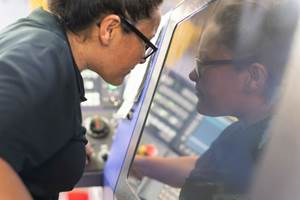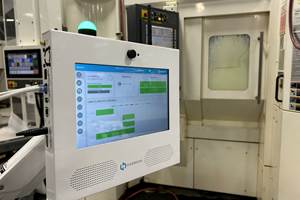Training Those Who Sell And Operate Machinery
The plight of many domestic metalworking companies across the United States today is not a result of improperly employing technology and processes, but of finding qualified and trained employees. In fact, this resonates strongly across the diverse spectrum of manufacturing and continues to be the largest issue confronting the ongoing viability of the United States to effectively compete in the global marketplace.
The plight of many domestic metalworking companies across the United States today is not a result of improperly employing technology and processes, but of finding qualified and trained employees. In fact, this resonates strongly across the diverse spectrum of manufacturing and continues to be the largest issue confronting the ongoing viability of the United States to effectively compete in the global marketplace. The American Machine Tool Distributors’ Association (AMTDA), representing nearly 500 providers of manufacturing technology and services, is involved in several initiatives to support this area of importance for machine shops nationwide.
Rapid changes in machine tool technology, growing sophistication of computerized equipment and the ability of machines to perform multiple tasks have added even more pressure to the manufacturing marketplace. Increasing the visibility of rewarding careers and providing the prerequisite training during the fundamental stages of education is critically important to entice new blood into the industry. To meet the need of introducing students to careers in manufacturing technology, this past April AMTDA organized a Student Summit during the Indiana Machine Tool Show in Indianapolis. With the cooperation and effort of the Indianapolis Chapter of the Tooling and Machining Association (INTMA), more than 300 high school students participated in the program focusing on career opportunities, orientation on the state and future of manufacturing technology, and the opportunity to interface with industry individuals at the show.
After spending 2 hours touring the exhibits on the show floor, students were led to the adjacent Indiana State Capitol Building where they gathered to hear and see presentations from industry representatives. Harry Moser, president of Charmilles Technologies Corporation (Lincolnshire, Illinois); Tom Hamblen, president of INTMA and Hamblen Gage Corporation (Indianapolis, Indiana); and Steve Overton, president of Overton & Sons Tool & Die (Mooresville, Indiana) offered their unique perspectives. While Mr. Moser focused his presentation on career and earning opportunities, both Mr. Hamblen and Mr. Overton reflected on how they became involved in manufacturing and on owning their own businesses. Mr. Hamblen noted, “We must attract more talented individuals into our industry to fill the openings for skilled machinists and tool makers. Our industry cannot support enough apprentices to fill the future openings. College level training in precision machining is one answer to this skill shortage.”
Along similar lines, AMTDA instituted a certification program for machine tool sales engineers in 1993 that was committed to improving the skills, professionalism and proficiency of individuals involved in proposing machine and process solutions to metalworking equipment users. Since its introduction, the Certified Machine Tool Sales Engineer (CMTSE) program has attracted and educated more than 1,100 individuals from nearly 250 machine tool distributor and builder companies throughout the United States. The AMTDA is also a member organization supporting the National Institute of Metalworking Skills (NIMS) formed in 1995 to develop a skilled workforce for manufacturing companies. Both initiatives to train individuals who sell and operate metalworking equipment are in the best interest of the entire industry and the nation’s manufacturing base.
The CMTSE program’s development and introduction was in response to surveys showing that machine tool users perceived a need for better sales and technical expertise from machine tool sales engineers. The AMTDA provides eligible applicants with a comprehensive two-volume Candidate Study Guide addressing the multi-disciplinary topics covered in the CMTSE examination. The Candidate Study Guides, which were developed as a resource for machine tool sales engineers, are constantly updated to reflect changes in technology, manufacturing processes, sales methodology and industry marketing trends.
The CMTSE designation is becoming the standard within the industry, as machine-tool sales typically involve large amounts of money and extensive negotiations. The CMTSE process adds credibility because the certified sales engineer is knowledgeable in both technology and sales administration.
Information on NIMS can be found at www.nims-skills.org, and information on CMTSE can be found at www.amtda.org.
Related Content
8 Ways to Increase Productivity on the Manufacturing Floor
When it comes to machine shop productivity, continuous improvement depends on efficient employees, equipment and processes.
Read MoreIMTS Takeaways From the Modern Machine Shop Editorial Team
The first in-person IMTS in four years left the MMS editorial staff with a lot to digest. Here are a few of our takeaways from the show floor.
Read MoreWill the “Great Resignation” Become an Opportunity for Manufacturers? Get Ready for the Returning 3 Million
The Great Resignation will become a Great Reapplication when employees currently able to stay out of the workforce return to it looking for something better. Machining employers that are already evaluating candidates for fit, without demanding specific skills coming in, might be positioned well to draw upon this wave.
Read MoreCan Connecting ERP to Machine Tool Monitoring Address the Workforce Challenge?
It can if RFID tags are added. Here is how this startup sees a local Internet of Things aiding CNC machine shops.
Read MoreRead Next
The Cut Scene: The Finer Details of Large-Format Machining
Small details and features can have an outsized impact on large parts, such as Barbco’s collapsible utility drill head.
Read More3 Mistakes That Cause CNC Programs to Fail
Despite enhancements to manufacturing technology, there are still issues today that can cause programs to fail. These failures can cause lost time, scrapped parts, damaged machines and even injured operators.
Read More












.png;maxWidth=300;quality=90)









